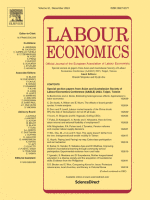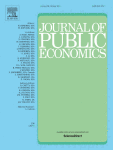Research
Publications:(* indicates the corresponding author)
English
32
Breaking Silence: How Intimate Partner Violence And Reporting Shape Later Life Outcomes
2025
Harrison Chang, Shiau-Fang Chao, Kuan-Ming Chen, Ming‐Jen Lin
Journal of Labor Economics, Forthcoming
We study the impact of Intimate Partner Violence (IPV) on various aspects of the victims’ lives throughout the course of violence, including their labor market performance, marital decisions, fertility decisions, and health outcomes. Our data consists of the universe of administratively reported IPV cases primarily from hospitals, police, and helplines in Taiwan from 2012 to 2018. We distinguish the violence effect and the report effect. We use later-treated victims as control groups under an event study framework. Among all victims who eventually report IPV to the officials, we find (i) women’s employment rate decreases after the onset of violence, but an incremental positive effect follows after reporting, particularly among young and educated women; (ii) the probability of divorce increases for both men and women after the report but not at the violence onset; (iii) reduction in additional childbirth after reporting regardless of the victim’s gender; (iv) rising depression outpatient-visits after violence and reporting among women.
31
The apple doesn't fall far from the tree: Intergenerational wealth mobility in Taiwan
2024
Yu-Wei Luke Chu, Ming-Jen Lin, Huici Nian
Labour Economics
Volume 91, Article Number : 102617
We estimate intergenerational wealth mobility using administrative records from Taiwan and find strong intergenerational rank correlations in household gross wealth, around 0.40 for sons and 0.30 for daughters. The wealth rank correlations are similar for single and married children, even though married children have greater household wealth and relatively strong assortative mating. The intergenerational wealth correlation is nonlinear and particularly strong for families in the top 10 % of household wealth. Different family sizes and gender compositions do not significantly affect intergenerational wealth mobility, regardless of the children's gender or marital status. Since our sample includes only parents who are still alive, these correlations are not driven by bequests. However, inter vivos transfers appear to play a significant role.
30
Estimating intergenerational health transmission in Taiwan with administrative health records
2024
Harrison Chang a, Timothy J. Halliday b, Ming-Jen Lin c, Bhashkar Mazumder
Journal of Public Economics
Volume 238, Article Number: 105194
We use population-wide administrative health records from Taiwan to estimate intergenerational persistence in health, providing the first estimates for a middle-income country. We measure latent health by applying principal components analysis to a set of indicators for 13 broad ICD categories and quintiles of visits to a general practitioner. We find that the rank–rank slope in health between adult children and their parents is 0.22 which is broadly in line with results from other countries. Maternal transmission is stronger than paternal transmission and sons have higher persistence than daughters. Persistence is also higher at the upper tail of the parent health distribution. Persistence is lower when complete data on outpatient care is unavailable. Health transmission is almost entirely unrelated to household income levels in Taiwan. We also find that there are small geographic differences in absolute health mobility across townships and that these are modestly correlated with area-level income and doctor availability.
29
Is Asian flushing syndrome a disadvantage in the labor market?
2023
Daiji Kawaguchi, Jungmin Lee, Ming-Jen Lin, Izumi Yokoyama
Health Economics, Volume32, Issue7, Pages 1478-1503
A large fraction of people in East Asia are incapable of digesting alcohol because of a genetic deficiency. This study examines whether the variation in alcohol tolerance contributes to inequality in the labor market. We conduct our original surveys in Japan, Taiwan, and Korea with the measurement of respondents' degree of alcohol tolerance by a bio-marker test. We find that alcohol-tolerant men consume significantly more alcohol, but their earnings and hours worked do not differ from those of alcohol-intolerant men. Despite a prevalent view that drinking alcohol is indispensable to establish good relationships with colleagues and business partners, our results suggest that there is no systematic impact of alcohol tolerance on labor market outcomes.
28
Curriculum and National Identity: Evidence from the 1997 Curriculum Reform in Taiwan
2023
Wei-Lin Chen, Ming-Jen Lin, Tzu-Ting Yang
Journal of Development Economics volume163(C), Article number: 103078.
This paper examines the causal effects of textbook content on individuals’ national identity, by exploiting a curriculum reform that introduced a new perspective on Taiwan’s history for students entering junior high school after September 1997. Using a repeated nationally representative survey and a regression discontinuity design, we show that students exposed to the new textbooks were more likely to hold exclusive Taiwanese identity rather than dual identity (i.e. Taiwanese and Chinese). The effect was greater for academic track students and those living in neighborhoods where fewer people identify as Taiwanese. In addition, our results suggest that the new curriculum had little impact on people’s political preferences related to Taiwan independence. Finally, we find that the probability of reporting as Taiwanese among old textbook readers converges with that of people reading new textbooks in the long run since the perspectives of old textbooks are in conflict with the recent social trends.
Chinese
8
入學管道與學習表現 (Multi-channel Admission and Academic Achievement)
2020
李維倫*、古慧雯、駱明慶、林明仁
經濟論文叢刊, 48(1), pp 31-76.
我們使用2007–14年間入學之台大學生的學籍資料、入學考試成績和在學成績,探討不同管道學生入學後的學業表現差異,並藉此評估多元入學政策在台大實施的成效。我們發現,以個人申請管道入學學生的學業成績雖然顯著優於透過指考入學的學生,但學測成績的差異即可解釋兩者入學後學業表現的大部分差異;控制學測成績後,申請生和指考生的學業成績並沒有顯著差異。而在轉系與退學的面向,申請、繁星生無論在轉系、成績因素退學和主動退學的比例,皆明顯低於指考生。在繁星計畫/繁星推薦方面,繁星生平均的學業表現優於申請生和指考生。這不只是來自明星高中繁星生的貢獻,非明星高中繁星生的學業表現平均而言也顯著高於指考生。然而如果只看來自2011–15年內無人以申請或指考進入台大的高中的繁星生,其學業成績則顯著低於指考生。此一差異也可以用學測成績的差異來解釋;控制學測成績後,這些繁星生和指考生的學業成績並沒有顯著差異。
6
論家戶所得與資產對子女教育之影響—以1993-1995出生世代及其父母稅務資料為例 (Education Opportunity Inequality Across Income in Taiwan)
2019
沈暉智*、林明仁
經濟論文叢刊,47(3), pp 393-453.
本文探討親代所得與資產如何影響子代教育取得之機會。分析財稅資料中心2000–2015年之母體層級稅務資料,串連親代所得、資產及子代的就學資料後,發現家戶所得及資產與高等教育的就讀機會呈高度相關。台灣大學與公立學校的學生家戶年所得中位數分別超過150、100萬元,遠高於全體樣本中位數86萬元。進一步檢視各大專院校及學制的資產分佈,則凸顯不同學制間鉅額的財富差距及代際流動於教育管道的僵固。最後,各校每生平均教育經費支出與學生家戶所得組成間的正向關係,也凸顯了政府的教育經費補貼其實是反向重分配的事實。
5
身高對學生綜合分析能力的影響:以「台灣教育長期追蹤資料庫」為例 ( Effect of Height on Cognitive Ability in Adolescence: Evidence from Taiwan Education Panel Survey)
2013
林明仁、蔡欣純、丁心嵐*
經濟論文(台灣經濟學會年會特刊), 41(4)pp 507-558.
本文探討身高對學生綜合分析能力的影響。以綜合分析能力做為認知能力的代表,OLS結果顯示身高與認知能力呈正相關,並排除身高是反映自尊、人際支配、健康、社團經驗、非認知能力等影響認知能力的假設。為修正可能因內生性問題導致的估計誤差,我們使用傾向分數法與「初經年齡」做為工具變數加以修正。我們發現女生初經年齡較早者青春期身高較高,其認知能力也較高。本文結果說明青春期的認知能力受到發育快慢的影響,越早進入青春期發育的青少年,認知能力越好。身高則是反映發育的時間點,因此可作為認知能力高低的代理變數。
4
經濟學門學術期刊評比更新 (The Updated Ranking of Academic Journals in Economics)
2013
曹添旺*、王泓仁、林明仁、張俊仁、陳宜廷、黃粲堯
經濟論文,41(3), pp 327-361.
研究成果品質的判定,在高等教育與研究機構之學術表現評鑑,及內部人士聘用與升等上,都扮演著重要的角色。就經濟學門�而言,期刊論文是最重要的研究成果出版形式,因此期刊品質的判定對經濟學門的發展十分重要。台灣過去幾年,已有不少針對國際期刊與本國期刊評比之論著,以及根據這些結果所計算出之學術單位表現。然而,相關研究發表至今,經濟學研究領域發生不少變動,也有許多新期刊快速興起;僅以SSCI資料庫收錄之經濟期刊而言,其收錄數也在近幾年從二百多種增加到三百多種。有鑑於此,本文爰採用文獻中新進提出的客觀量化排序方法、並參考傑出學者專家的意見,重新對當前的國際及國內經濟學期刊加以評比排序,俾供參考。




